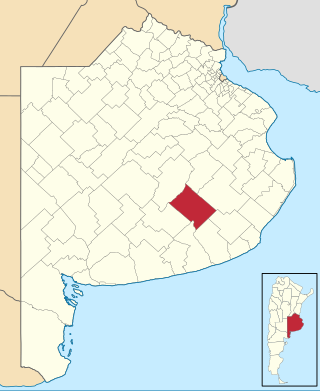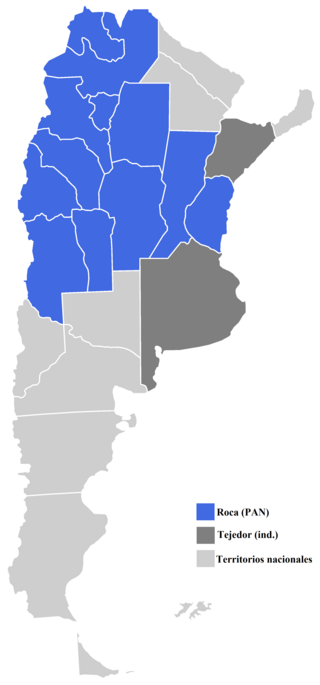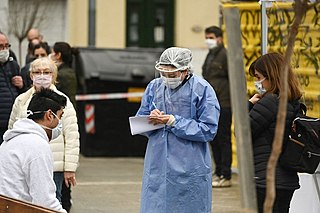| |||||
| Decades: | |||||
|---|---|---|---|---|---|
| See also: | Other events of 1969 List of years in Argentina | ||||
Events from the year 1969 in Argentina .
| |||||
| Decades: | |||||
|---|---|---|---|---|---|
| See also: | Other events of 1969 List of years in Argentina | ||||
Events from the year 1969 in Argentina .

Argentina is divided into twenty-three federated states called provinces and one called the autonomous city of Buenos Aires, which is the federal capital of the republic as decided by the Argentine Congress. The provinces and the capital have their own constitutions, and exist under a federal system.

Buenos Aires, officially the Autonomous City of Buenos Aires, is the capital and primate city of Argentina. The city is located on the western shore of the Río de la Plata, on South America's southeastern coast. "Buenos Aires" is Spanish for "fair winds" or "good airs". Buenos Aires is classified as an alpha global city, according to the Globalization and World Cities Research Network (GaWC) 2020 ranking.

Buenos Aires, officially the Buenos Aires Province, is the largest and most populous Argentine province. It takes its name from the city of Buenos Aires, the capital of the country, which used to be part of the province and the province's capital until it was federalized in 1880. Since then, in spite of bearing the same name, the province does not include Buenos Aires proper, though it does include all other parts of the Greater Buenos Aires metropolitan area. The capital of the province is the city of La Plata, founded in 1882.

Manuel Guillermo Pinto was an Argentine general and lawmaker.

Leandro Nicéforo Alem was an Argentine politician, founder and leader of the Radical Civic Union. He was the uncle and political teacher of Hipólito Yrigoyen. He was also an active Freemason.

Tomás Eloy Martínez was an Argentine journalist and writer.

Tandil Partido is a partido of Buenos Aires Province in Argentina.

The Uruguayan Civil War, also known in Spanish as the Guerra Grande, was a series of armed conflicts between the leaders of Uruguayan independence. While officially the war lasted from 1839 until 1851, it was a part of armed conflicts that started in 1832 and continued until the final military defeat of the Blancos faction in 1904.

Argentina held national presidential and legislative elections on Sunday, 23 October 2011. Incumbent president Cristina Fernández de Kirchner of the Front for Victory won in a landslide, with 54.11% of votes against Hermes Binner of Broad Progressive Front, she also secured a second term in office after the Front for Victory won just over half of the seats in the National Congress.

The State of Buenos Aires was a secessionist republic resulting from the overthrow of the Argentine Confederation government in the Province of Buenos Aires on September 11, 1852. The State of Buenos Aires was never recognized by the Confederation; it remained, however, independent under its own government and constitution. Buenos Aires rejoined the Argentine Confederation after the former's victory at the Battle of Pavón in 1861.
Events from the year 1940 in Argentina
Events in the year 1867 in Argentina.
Events in the year 1875 in Argentina.
The Freemen of the South were belligerents in an 1839 rebellion in south Buenos Aires province, Argentina against Federalist Governor Juan Manuel de Rosas. A mixture of disgruntled ranchers and Unitarian revolutionaries, the Freemen briefly took control of Dolores, Chascomús and Tandil, and expected to join forces with General Juan Lavalle, who was to lead an army from Uruguay. The rebellion was ultimately defeated at the Battle of Chascomús, and Rosas remained in power in Buenos Aires.

The Argentine presidential election of 1880 was held on 11 April to choose the president of Argentina. Julio Argentino Roca was elected president.

The COVID-19 pandemic in Argentina was a part of the worldwide pandemic of coronavirus disease 2019 caused by severe acute respiratory syndrome coronavirus 2. As of 27 June 2023, a total of 10,044,957 people were confirmed to have been infected, and 130,472 people were known to have died because of the virus.
The 2020 COVID-19 pandemic in Argentina affected the human rights situation in the country.

This article presents official statistics gathered during the COVID-19 pandemic in Argentina. The National Ministry of Health publishes official numbers every night.